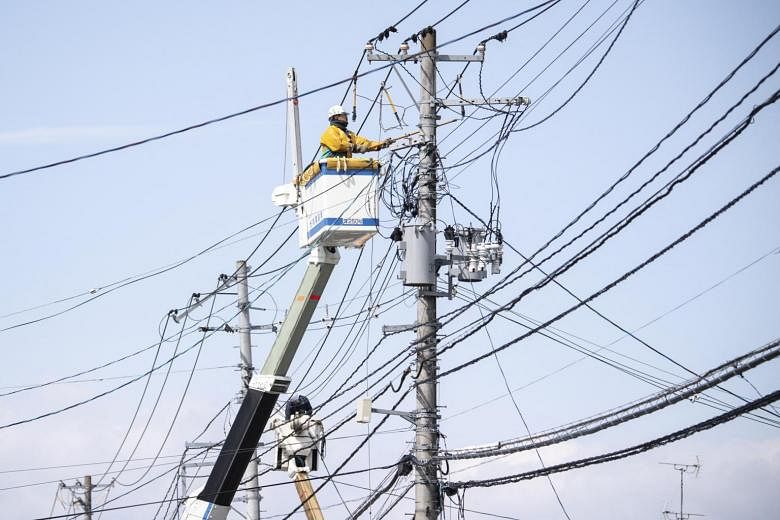TOKYO (REUTERS) – Neon signs were turned off, lights dimmed and thermostats dialled down in Japan on Tuesday (March 22) after the government issued an urgent call to save energy, warning of blackouts after an earthquake last week caused a serious power shortage.
As snow fell in Tokyo and the temperature dropped to 2 Celsius, Tokyo Electric Power Co (Tepco) said demand had spiked and up to 3 million households could lose power after 8pm if usage rates did not come down.
“At this rate, we are coming closer to a state where we will have to conduct power outages similar to those that took place after the quake,” Minister of Economy, Trade and Industry (METI) Koichi Hagiuda told a news conference.
The magnitude 7.4 earthquake on Wednesday (March 16) last week off the northeastern coast – the same region devastated by an earthquake and tsunami in 2011 – temporarily cut power to about 2 million households, including hundreds of thousands in Tokyo.
The quake hit six thermal plants, knocking them out of operation in areas served by Tepco and Tohoku Electric Power Co, and the damage could leave some of them idle for weeks or even months, Hagiuda said.
Hagiuda called for an additional 5 per cent or so of power savings every hour from 3pm to 8pm, equivalent to about 2 million kilowatts per hour.
Chief Cabinet Secretary Hirokazu Matsuno earlier called on residents in eastern Japan impacted by the power crisis to do their part.
“We request your cooperation ... such as by lowering your thermostats to around 20 degrees Celsius and switching off any unnecessary lights,” he told a news conference.
Numerous users responded to the call. National broadcaster NHK dimmed its studio lights while electronics retailer Bic Camera turned off about half of the televisions at dozens of its stores.
The 634-metre Tokyo Skytree tower turned off its lights for the whole day for the first time and operators of the city-centre Tokyo Tower lit up only its bottom half.
‘Restart nuclear power’
Retail giant Seven & I Holdings said 8,500 7-Eleven stores set their thermostats to 20 C – one degree cooler than usual – while its Ito-Yokado supermarkets were dimming their lights by 10 per cent.
Nissan Motor said it was using an in-house power generator for 13 hours at its factory north of the capital.
Many individual consumers also did their bit.
“I use the heater a lot so I will try to do my part to save energy,” said college student Shuntaro Ishinabe, 22.
Government spokesman Matsuno said the request to save energy was unlikely to extend beyond Tuesday given the expected rise in temperatures and the addition of more solar power generation as the weather improved.
Japan has faced a tough energy market since the 2011 earthquake and tsunami crippled Tepco’s Fukushima Daiichi plant, causing the worst nuclear disaster since Chernobyl and leading to the suspension of operations at most of Japanese nuclear reactors.
With energy prices surging on tight global supply and the Ukraine crisis, Japan’s biggest business lobby, Keidanren, has been calling for a swift restart of the nuclear plants.
“A sudden halt of energy causes a lot of problems, and I think (the general public) has really felt the importance of energy security given recent events,” Keidanren Chairman Masakazu Tokura said.
“Given the larger trend to become carbon neutral and cut back on greenhouse gases, I believe there will be more difficulties unless we restart nuclear power plants swiftly.”
Tepco said 100 per cent of power generation capacity was forecast to be used to meet peak demand in its service area between 4pm and 5pm. It had requested seven regional utilities to provide up to 1.42 million kilowatts of electricity to ease the crunch.

